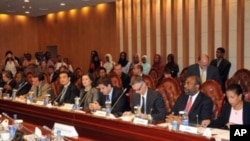The secretary for peace negotiations for the Darfur-based Liberation and Justice Movement (LJM) said his group will be negotiating with Sudan’s government on how to disburse the $2 billion donated by Qatar’s government.
Qatari Emir Sheikh Hamad bin Khalifa Al-Thani donated the money to set up a Darfur Development Bank after peace returns to the conflict-plagued region.
Tadjadine Beshir Niam told VOA his group is a unionist movement that is not interested in secession of the Darfur region from Sudan, despite what he calls Khartoum’s often broken promises.
“We want to have a workshop and we want to see how this $2 billion can be arranged in order (for it) to contribute to the reconstruction and the development of Darfur.”
Niam also said the talks with Khartoum are progressing steadily.
“On the 19th of this month, the steering committee is going to raise a report with the mediation on the agreed and the non-agreed (issues). Then, the mediation is going to produce a final document for both partners to sign, if it is acceptable to them.”
The rebels are currently holding negotiations with President Omar Hassan al-Bashir’s government in the Qatari capital Doha aimed at resolving the crisis in Darfur.
Niam said the LJM is hopeful the ongoing negotiations will yield positive results for the people of Darfur.
“We decided also to have wider consultations with the people of Darfur, including IDP’S (Internally Displaced People), refugees, as well as those in the Diaspora, to talk to them about the importance of having these meetings (the Doha talks).”
Niam said the outstanding issues include power sharing. “The question of the region of Darfur is the main challenge between the parties,” Niam said.
“While the LJM delegation insists on reinstituting the region as one of the important aspects of the agreement,” he said, “the government is still (unyielding). We have the vice (president) as one of the issues because (we) strongly believe that the people of Darfur should be represented (in the) presidency as the vice (president). And, also, we have an issue of compensation.”




